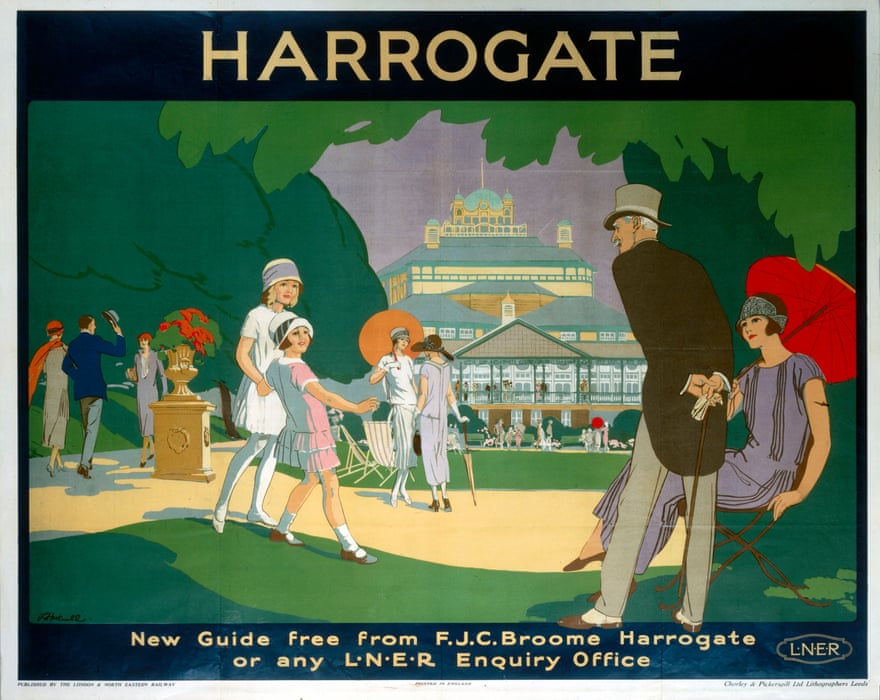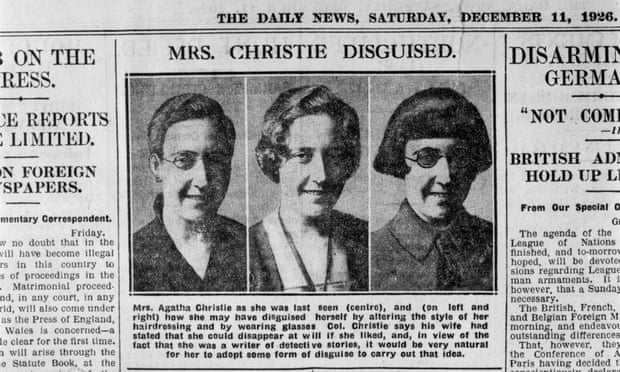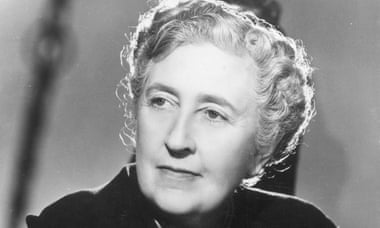Agatha Christie was sitting quietly on a train when she overheard a stranger saying her name. In the carriage, she said, were “two women discussing me, both with copies of my paperback editions on their knees”. They had no idea of the identity of their fellow passenger, and proceeded to discuss the most famous author in the world. “I hear,” said one of the ladies, “she drinks like a fish.”
I love this story because it sums up so much about Agatha Christie’s life. They both had her paperbacks. Of course they did. Christie wrote more than 80 books, outsold only by Shakespeare and the Bible, so the cliche runs. And she wasn’t just a novelist, either: she remains history’s most performed female playwright. She was so successful people think of her as an institution, not as a breaker of new ground. But she was both.
And then, in the railway carriage, there’s the watchful presence of Christie herself, unnoticed. Yes, she was easy to overlook, as is the case with nearly any woman past middle age. But she deliberately played on the fact that she seemed so ordinary. It was a public image she carefully crafted to conceal her real self.
If the women on the train had asked her profession, she’d have said she had none. When an official form required her to put down what she did, the woman who is estimated to have sold 2bn copies always wrote “housewife”. Despite her gigantic success, she retained her perspective as an outsider and onlooker. She sidestepped a world that tried to define her.
When I told people I was writing about Christie, their first questions were often about the 11 dramatic days in 1926 when she “disappeared” at the height of her writing career, causing a nationwide hunt for her corpse. It’s a mystery that has obsessed her fans ever since.
By this stage, Christie was already a celebrity. The Murder of Roger Ackroyd, her ingenious masterpiece, had just been published and her literary agent was pushing for a follow-up. There were photos of her in the Daily Mail, a new publishing contract with William Collins and a £500 advance for serial rights to The Man in the Brown Suit that paid for a Morris Cowley car.
But by December 1926, her marriage to Archie Christie was in trouble. She herself, she later wrote, was “at the beginning of a nervous breakdown”. The couple had moved to a grand 12-bedroom house in Sunningdale, Berkshire, which they named Styles, but Archie was often absent and Agatha was increasingly unhappy there. The death of her beloved mother, and Archie’s unsympathetic response (he didn’t even go to the funeral), had strained their relationship almost to breaking point when Archie confessed that he was in love with someone else – a young woman called Nancy Neele – and wanted a divorce.
It has often been claimed that Christie went into hiding in order to frame her husband for her murder. Was this true? It’s also frequently said that Christie remained silent about this notorious incident for the rest of her life. But that’s incorrect, and I’ve pieced together the surprising number of statements she did in fact make about it.
What Christie said has the unfortunate effect of sounding like one of her novels, in which the “loss of memory” plot would feature time and time again. But her writings about her life have had this novelising tendency all along. It doesn’t mean she is lying.
“I just wanted my life to end,” she explained. “All that night I drove aimlessly about … In my mind there was the vague idea of ending everything. I drove automatically down roads I knew … to Maidenhead, where I looked at the river. I thought about jumping in, but realised that I could swim too well to drown … then back to London again, and then on to Sunningdale. From there I went to Newlands Corner.”
She was tired; she was in deep distress. At last, she put into action a vague plan that had occupied her thoughts for the previous 24 hours.
“When I reached a point in the road which I thought was near the quarry I had seen in the afternoon, I turned the car off the road down the hill towards it. I left the wheel and let the car run. The car struck something with a jerk and pulled up suddenly. I was flung against the steering wheel and my head hit something.”
Christie’s car was found lodged in a hedge, its front wheels “over the edge of the chalk pit”. Had it not been for the hedge, “the car would have plunged over and been smashed to pieces”. It seems that Christie shocked herself into realising that whatever happened, life was worth living.
And so, dazed, distressed, but alive, she got out of her car. With injuries from the impact to her head and chest, she walked through the wintry countryside in a dreamlike state. She was reborn. “Up to this moment I was Mrs Christie,” she explains. Now, she had sloughed off the past like a dead skin. Only that way could she survive. She abandoned her car and walked away, out of her old life. This was the action that would leave her family, friends and the police absolutely flummoxed.
For a long time, people investigating Christie’s disappearance have tended towards one of two positions. One is that, in the days after the crash, she was experiencing the specific condition of dissociative fugue – a state brought on by trauma and stress, in which you literally forget who you are. The alternative position is that she was faking it, even trying to frame Archie for killing her. Only one thing can be said for certain: on Saturday 4 December 1926, and for some days thereafter, Christie experienced a distressing episode of mental illness, brought on by the trauma of the death of her mother and the breakdown of her marriage. She lost her way of life and her sense of self.
So what should we believe? Christie reported that on that Saturday morning, while the police were investigating her abandoned car, she had “lost her memory”. With the help of a psychotherapist, she would later begin to put together a narrative of the movements she had blanked out. “I remember arriving at a big railway station,” she recalled, eventually, “and being surprised to learn it was Waterloo.”
“It is strange,” she said, that “the railway authorities there did not recall me, as I was covered with mud and I had smeared blood on my face from a cut on my hand.”
Christie’s mind began to protect itself from further pain by inventing a new identity. “I had now become in my mind Mrs Teresa Neele of South Africa,” she says. Someone who had the same surname as Archie’s lover, someone who came from a place where she and Archie had been happy. “You can’t write your fate,” Christie would say, years later, but “you can do what you like with the characters you create”. So she created a new character for herself, a character as which she could do what she wanted. What she wanted most of all was to escape from the unbearable life of Mrs Christie.
“Teresa Neele” went to King’s Cross and bought a ticket for the spa resort of Harrogate.

The winter light must have faded by the time her train arrived. She took a taxi to a hotel, apparently picked at random, called the Hydropathic. She’d always liked the anonymity of hotels, where she’d often stayed, alone, writing.
Christie arrived with no suitcase, but explained she had recently come from South Africa and had left her luggage with friends. She gave her name as Mrs Teresa Neele, signing the register in her usual handwriting.
Mr W Taylor, the hotel’s manager, stated later that his guest took a “good room on the first floor, fitted with hot and cold water”. The price of seven guineas a week caused her no hesitation: “She seemed to have as much money as she wanted.”
Christie’s room was serviced by a young chambermaid named Rosie Asher, who seems to have kept a particularly close eye on her. Asher spotted that “Mrs Neele” had brought hardly anything with her. But she was desperate for her life to unfold in an orderly fashion. So she went down for dinner, and even took part in the evening’s dancing. The guests, who were also referred to as “patients”, embraced this single woman in their midst. “I danced with Mrs Christie the evening she arrived,” one of them said later. “She does the Charleston, but not very well.”
Christie seemed to enjoy her life in limbo. Her chambermaid noted that on Sunday, while police were searching the Surrey Downs for her, or her body, she “slept until 10am, had breakfast in bed and then went out”.
On Monday morning, Asher noticed Christie had the “London newspaper taken up with breakfast in bed”. It would have been hard to avoid the story about Mrs Christie’s disappearance, but she somehow managed to set the knowledge aside. She began to equip herself with a new wardrobe. Later that day, after a visit to the shops, packages began to be delivered to her room: “new hat, coat, evening shoes, books and magazines, pencil and fruit, and various toilet requisites”.
People noticed that she usually had a book in her hand. She’d been to the WH Smith Library in Parliament Street, where the librarian “gathered from her selections that she had a taste for novels of sensation and mystery”.
That evening, Christie came down to dinner in a proper evening dress, with a new “fancy scarf”. Hotel staff would report that “she has made a number of friends”. She played billiards and even sang aloud. Miss Corbett, the hotel’s entertainment hostess, spotted that “Mrs Neele” still had the price – 75 shillings – pinned to her new shawl. “Is that all you are worth?” asked one of the guests. “I think I am worth more than that,” was her answer.
At the Hydro, people were beginning to suspect who “Mrs Neele” really was. After all, on Tuesday 7 December, a portrait had appeared on the Daily Express’s front page. The resemblance was unmissable. “When she had been here about four days,” recalled the hotel’s manager, “my wife said to me: ‘I believe that lady is Mrs Christie!’” Mr Taylor thought his wife was being “absurd”, but she wasn’t the only one to have worked it out.
The following day the Westminster Gazette reported that no fewer than 300 police officers and special constables had taken part in a search in Surrey. They were pretty certain they were hunting for a corpse.
But Christie was oblivious. Life was much better now. “As Mrs Neele,” she said later, “I was very happy and contented.”
“At Harrogate,” she said, “I read every day about Mrs Christie’s disappearance … I regarded her as having acted stupidly.” A fellow guest remembered her saying that “Mrs Christie is a very elusive person. I cannot be bothered with her.” Also, according to this witness, Christie was beginning to show signs of mental distress. She “would press her hand to her forehead and say: ‘It is my head. I cannot remember.’”
Meanwhile Archie, stressed and terrified that his infidelity would be revealed by the papers, had made an awful mistake. He had given an ill-advised interview to the Daily Mail. Perhaps hoping to divert attention away from Nancy Neele, he introduced the idea that maybe his wife had deliberately disappeared.

“My wife,” he’d said to a reporter, “had discussed the possibility of disappearing at will … engineering a disappearance had been running through her mind, probably for the purpose of her work. Personally, I feel that is what happened.”
And he now defended himself against the charge that he’d been a bad husband: “
It is absolutely untrue to suggest that there was anything in the nature of a row or a tiff between my wife and myself on Friday morning … I strongly depreciate introducing any tittle-tattle into this matter … ”
Readers must have thought he protested far too much.
On the morning of Saturday 11 December, the Telegraph carried a big advert for a forthcoming serialisation of The Murder on the Links. It was trumpeted as the work of “Agatha Christie the Missing Novelist”. These were obviously the words of Christie’s publishers, not Christie herself. But readers could be forgiven for thinking the author was somehow cashing in on her new notoriety.
The author herself had had enough of reading the papers. At the Hydro, on the Sunday morning, no newspaper was taken up to the bedroom.
On the Tuesday, the Daily Mail ran an editorial. If Christie were alive, its writer argued, “she must be ready to inflict intense anxiety on her relatives and heavy expenditure on the public” in “a heartless practical joke”.

Unfortunately for Christie’s lasting reputation, many of her biographers, notably her male ones, have been as heavily invested in this narrative as the male police officers and journalists who made it into such a sensation at the time. “She set out deliberately – the facts shout it – to throw murder suspicion upon her husband,” says one of these writers.
From there, the idea has spread into films and novels. The milder have her down as a woman wronged, with an understandable desire for revenge. The more extreme – notably the feature film Agatha, made in 1979 – present her as the would-be murderer of Nancy Neele. And so the injustice has been perpetuated.
It’s time to do something radical: to listen to what Christie says, to understand she had a range of experiences unhelpfully labelled as “loss of memory”, and, perhaps most importantly, when she says she was suffering, to believe her.
Unbeknown to the police and public who were looking for her in Surrey, matters in Yorkshire were moving swiftly towards a denouement. That Sunday evening, two men went to Harrogate police station to report their suspicion that Mrs Christie was staying in the hotel where they worked.
Christie’s “disappearance” had the impact it did because of the 1920s context that saw a new kind of media celebrity being created. She wasn’t alone in becoming an author-as-celebrity. It may have been accidental, and deeply unpleasant, but it would also become a central plank of her massive success.